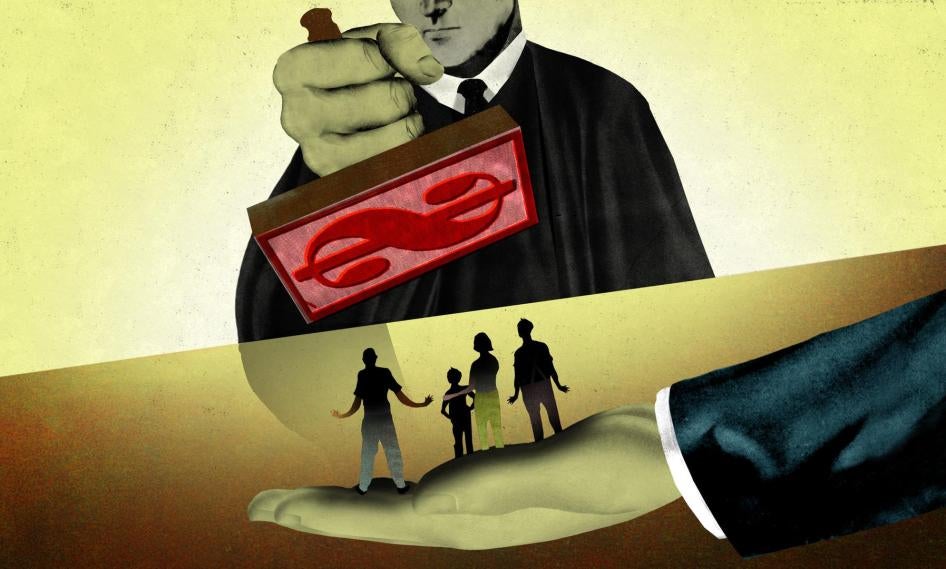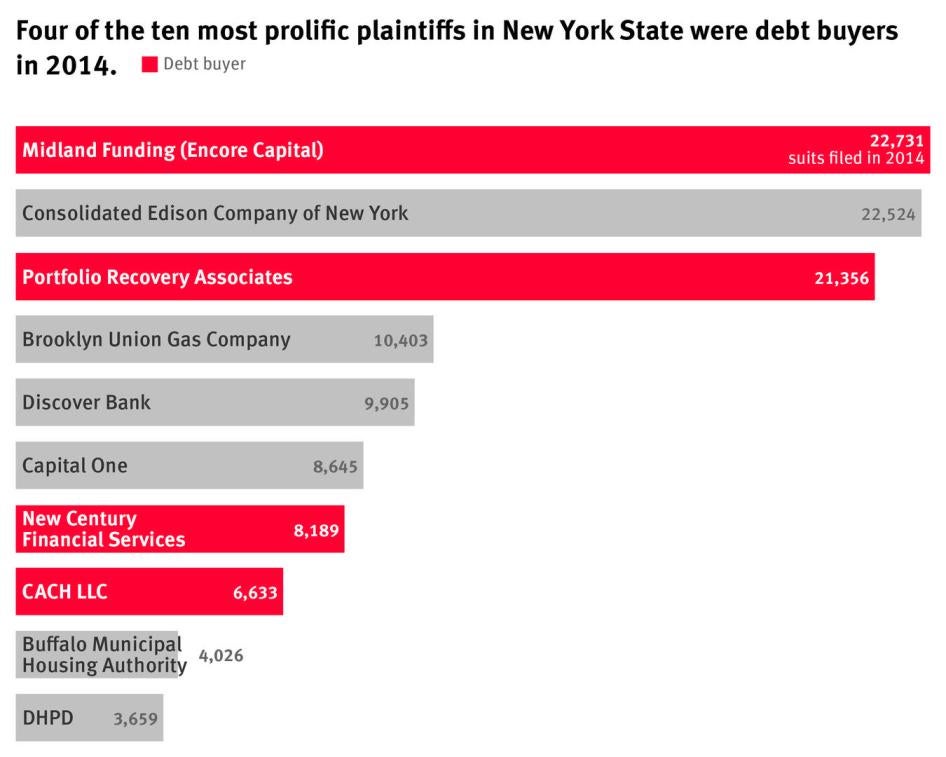(New York) – Courts across the United States have allowed multibillion-dollar corporations to secure judgments against alleged debtors en masse without providing meaningful evidence to support their claims, Human Rights Watch said in a report released today. Some legislatures and courts have also erected formidable barriers that block many alleged debtors from securing a meaningful hearing in front of a judge.
The 80-page report, “Rubber Stamp Justice: US Courts, Debt Buying Corporations, and the Poor,” scrutinizes how courts approach hundreds of thousands lawsuits brought every year by debt buyers – firms that specialize in buying up bad debts which they then try to collect for themselves. These suits have often been marred by patterns of apparent error, legal deficiency, and alleged illegality. Debt buyers have won court judgments against the wrong people, prevailed in suits that should have been barred by applicable state law, and garnished the wages or bank accounts of people who never received proper notice that they had been sued, along with other problems. Yet many courts continue to adjudicate these suits with astonishing speed and without subjecting them to any substantive scrutiny or even receiving meaningful evidence in support of the claims.
“Courts should be treating debt buyer lawsuits with heightened vigilance,” said Chris Albin-Lackey, senior legal adviser at Human Rights Watch. “Rubber stamping debt buyer suits threatens the rights of poor people and ultimately undermines the basic integrity of the courts.”
The report is based on interviews with people sued by debt buyers, judges, lawyers, public officials, and debt buyer representatives across several US states and at all levels of government. Some judges expressed frustration with legal frameworks, court rules, and resource constraints that they say prevent them from subjecting debt buyer litigation to the kind of scrutiny the cases deserve.
Human Rights Watch detailed pervasive problems with the way courts approach debt buyer lawsuits. The cases often pit multibillion-dollar corporations against people who cannot afford legal representation. Many defendants are effectively railroaded into paying off debts whose existence has never been proven, even when strong legal defenses are available to them.
Most defendants either cannot or do not mount any kind of an effective defense to the suits against them and in these cases many courts award default judgments in favor of plaintiffs without requiring much if anything in the way of evidence, Human Rights Watch found. This creates a risk that some courts rubber stamp large numbers of lawsuits that debt buyers could never win against a competent adversary in court – including some that are legally deficient or without supporting evidence.
Some courts make it very difficult for defendants who appear in court intending to fight the case to secure a meaningful hearing before a judge. Many courts push defendants into unofficial “negotiations” with debt buyer attorneys in the courthouse hallways. Human Rights Watch observed “hallway conferences” in which debt buyer attorneys misled or hectored defendants into capitulating and agreeing to pay without ever having the opportunity to present their side of the case to a judge.
Debt buying companies pay pennies on the dollar for vast portfolios of delinquent credit card and other debt, and then try to collect the full face value of those debts. Because the debts are purchased so cheaply, even a very low rate of collection can yield huge profits. Encore Capital, the industry leader, claims that one in every five US consumers either owes it money or has owed it money in the past. Encore and its largest competitor, Portfolio Recovery Associates, each collect $1 billion from US consumers every year, roughly half of that through debt litigation.
Much of the debt sold to debt buyers is credit card debt, carrying interest rates that routinely exceed 25 percent. The companies often allow interest to accumulate for years before filing suit, which can add thousands of dollars to the debts they ultimately try to collect in court. Many of the defendants are struggling or at the margins of poverty.
Debt buyers rank among the heaviest individual users of the US civil court system, filing hundreds of thousands of suits every year. In New York’s state court system, eight of the 20 most prolific civil plaintiffs were debt buying companies in 2014, filing more than 70,000 suits. Debt buyer lawsuits add to the overwhelming backlog of cases many courts already struggle to deal with, creating an incentive to dispose of the cases quickly rather than carefully.
Many debt buyer lawsuits rest on a foundation of highly questionable information and evidence. In some cases the debt sellers explicitly refuse to warrant that any information they pass on is accurate or even that the debts are legally enforceable. Enormous accumulations of interest are often added based entirely on the debt buyers’ calculations. The lawsuits themselves are then often generated largely by automated process.
The alleged debtors are often poor, with no access to legal representation or advice, and can ill-afford an unjust outcome in which one quarter of an already paltry paycheck may be garnished every month. Human Rights Watch interviewed alleged debtors who described struggling to pay utility bills, buy food, or secure basic needs for their children because of adverse judgments related to debts they did not recognize and did not believe they owed.
“I don’t have money for my baby’s diapers,” said a single mother interviewed in a Detroit courthouse. She said a debt buyer had won a judgment against her in a case she never received proper notice of and had no opportunity to answer. “My lights and gas is off right now. My paycheck is about 300 a week and sometimes I only bring home 220. I can’t afford [the garnishment] out of my check.”
In addition to the many courts that do little or nothing to help disadvantaged pro se litigants navigate the court system, some railroad defendants into dubious proceedings that speed the court’s workflow at the expense of defendants’ rights. Many courts pressure or require defendants to leave the courtroom to engage in unsupervised “negotiations” with debt buyer attorneys that can and do take a coercive or deceptive turn. In Philadelphia, the municipal court summons alleged debtors to courtroom proceedings that are effectively presided over by the debt buyer attorneys themselves.
Human Rights Watch outlined several concrete steps that courts and state legislatures could take to ensure greater respect for alleged debtors’ rights and secure the courts’ own basic integrity. New York’s courts have adopted rules that essentially require debt buyers to submit meaningful evidence to support their claims – as well as evidence that defendants were actually served notice of the suits against them – to be eligible for a default judgment. This should be a model for other states.
Courts in other states also have shown that by supporting and encouraging programs that allow alleged debtors to access independent legal advice, they can help address the profound inequality of arms presented by so many debt buyer lawsuits. Courts should under no circumstances encourage – or even allow – debt buyer attorneys to steer unrepresented defendants out of court for unsupervised “negotiations” that may take a coercive turn. The federal government should also consider passing legislation that puts a reasonable cap on the rate at which interest can accumulate on a debt after it is sold on by an original creditor to a third party.
“Courts should find ways to assist alleged debtors who don’t have legal representation instead of stacking the odds still further against them,” Albin-Lackey said. “Debt buying corporations should not be entitled to judgments en masse without evidence simply because defendants fail to mount an effective defense in court.”
Quotes from the report
New York Chief Judge Jonathan Lippman, on the situation that prevailed in New York before recent reforms were introduced:
You were signing a lot of shallow judgments. It’s hard to make a blanket statement that they all had merit.… We have all been remiss in letting these large purchasers of debt rule the day in court without ensuring the basic principles of setting court judgments based on evidence are met.… You can’t get by just by throwing a spreadsheet at us or some kind of form affidavit that does not tell us anything. We get cases with the wrong debtor being sued, cases with the wrong amount of debt being sued for, and cases with no proof that should warrant a judgment.
Michigan District Court Judge William Richards asked whether he felt confident that the default judgments issued by his court in favor of debt buyers had merit:
I have no way of knowing. The data isn’t there in front of me … the creditors just get whatever they asked for. It’s a problem. A default judgment gives the case a kind of credibility, right? As though there had been some kind of screening of these cases and a finding that they are legitimate. But there is nothing like that.… If we are going to allow [debt buyers] to use the court to elevate the validity of their claimed debt by attaching a judgment to it, maybe we should make them provide some kind of proof that they are actually owed it.









